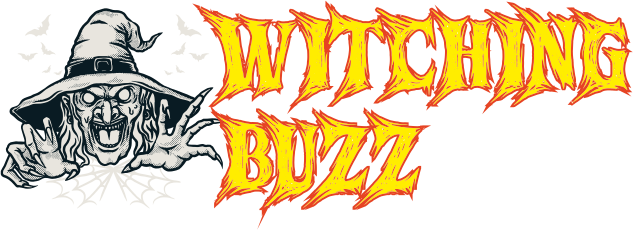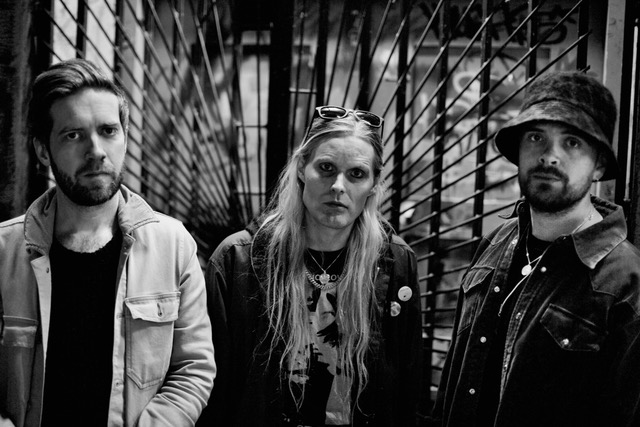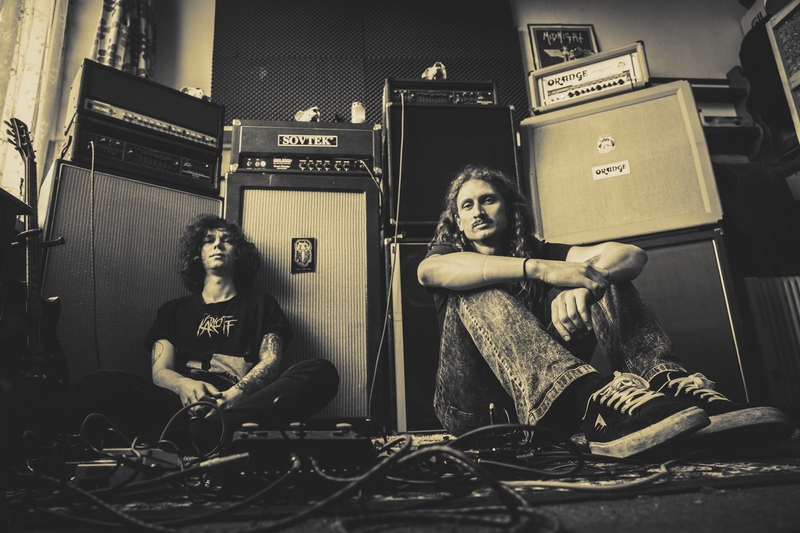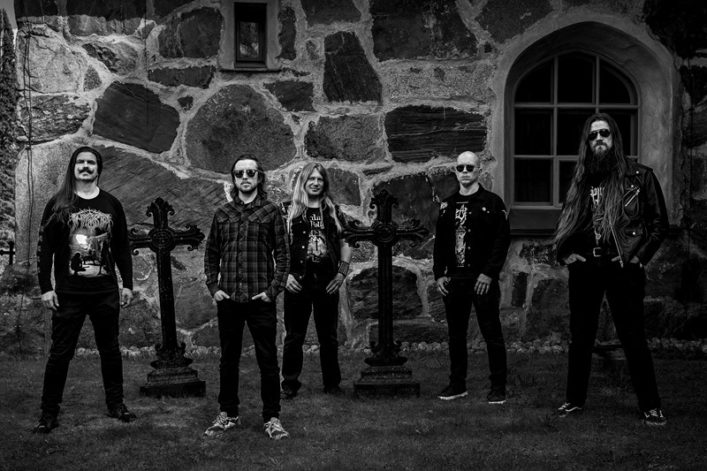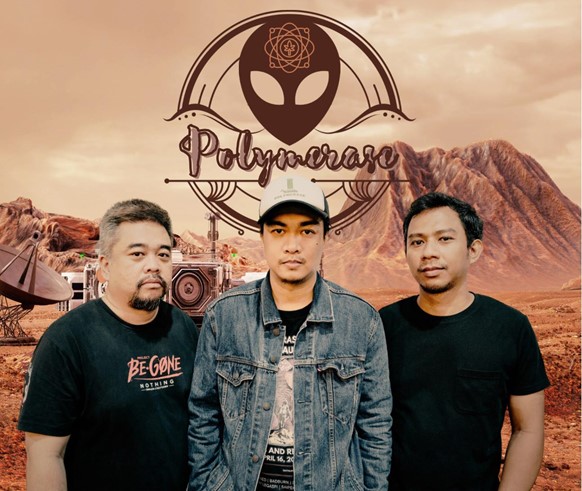Power trio from Stockholm, Sweden.
The Origin & Identity:
How did you all come together as a band, and when did it feel real?
We’ve known each other for a long time and played together in different constellations before, so forming a band was mostly a matter of timing. Over the past 10+ years we’ve all been busy with different projects, but suddenly we found ourselves living in the same city again (Stockholm), and everyone was excited to start jamming. Finding band members when you’re 40 isn’t as easy as it was at 20, so there’s definitely that “real recognizes real” principle at play. We’re still as hungry as we’ve ever been, and that’s crucial if you want to keep a band going alongside work, relationships, family life, and everything else that often comes with adulthood.
Where did your band name come from, and why does it feel like you?
I’ve had the band name in the back of my mind for quite a while, mostly because it sounds rowdy, explosive, and loud. It also has a bit of a ’70s vibe — I’m not sure if it’s the word itself or the lettering, but it feels retro, and that’s never a bad thing. It just fit with our music. In the beginning, we joked that it referred to our guitarist Martin’s tireless ability to talk (he’s unstoppable!).
And of course, we swapped the O for an Ö as a little homage to Motörhead. RIP Lemmy!
Did you have a clear vision for your sound from the start, or did it develop naturally?
Honestly, we probably all had different visions and were equally disappointed when it didn’t turn out the way we expected, haha. But that’s the beauty of making music together — the result is always a mix of everyone’s styles and influences, and hopefully that blend becomes something original and exciting. We’ve only released one album so far, so we’re still in the middle of our metamorphosis. But with every rehearsal, it feels like we’re getting closer to some kind of musical core — whatever that may be.
What should listeners know about your newest album?
I think the music speaks for itself.
Influences & Creative Process:
Who or what has shaped your sound in ways people might not expect?
When we played at the Swedish stoner/doom festival Krökbacken last summer, a guy came up to me after the show and asked if I listened to Dead Meadow, which I confirmed that I did.
How he picked up on that, I have no idea. Personally, I really can’t hear it — except maybe a hint in my bass playing. I guess it could be that kind of monotonous psychedelic groove that I enjoy.
When it comes to writing lyrics, I’ve actually benefited quite a lot from having listened to a lot of hip-hop throughout my life. That’s hardly something you can hear either, though.
When creating a song, do you follow a routine or mix it up each time?
Most often, one of us comes in with a riff or two, and we build from there. On the new album we’re recording this fall, a few songs actually grew out of jams in the rehearsal space — and I think I like that even more. There’s something powerful about music being born without words, when everyone just plays and suddenly there’s a groove that feels right. Most of our songs have jammy elements anyway, but usually there’s a core idea that someone brought from home.
Are there moods, riffs, or ideas you find yourself returning to?
We probably all return to the things we like, and all our songs are a mix of that — as I mentioned earlier. I personally have a soft spot for psychedelic elements, monotony, and fuzz. Martin is into noise rock, goth, old-school metal, and a thousand other things. Fredrik listens a lot to Americana, Black Metal and Kendrick Lamar these days (quite an interesting mix, right?), but he grew up on grunge and hard rock. I think it’s still too early to say whether we’re circling back to specific ideas or not. My feeling is that we return to our individual preferences when we play together, while at the same time staying open to wherever the band is heading.
How do you make writing decisions — together or does someone usually lead?
We make decisions democratically in the band, because otherwise it would be impossible to move forward. Often we agree, just as often we don’t.
Sometimes you just have to accept that the other two feel differently, and that your own preference has to take a back seat. The nice thing is that more often than not, you realize later on that it actually turned out really great the way you didn’t originally think it would.
Musical Technique / Composition:
When layering sounds, do you focus more on tone or on mood?
I’m always more interested in mood. Honestly, I don’t know how to focus on anything else musically. Since I’m not classically trained, my approach has always been: “If it sounds good, it is good.”
Sometimes I feel like I don’t know what I’m doing — but that’s what makes it exciting. You’re always exploring new ways to make music as you keep learning.
Do you use alternate tunings, odd meters, or unusual chords to shape your sound?
I don’t, but Martin definitely does. He switches between three or four guitars when we rehearse. I don’t know if that’s strictly necessary, but I think it keeps things interesting for him — and he’s pretty damn good at it. Personally, I get confused enough with standard tuning, so I stick with that, haha.
How much of your arrangements come from improvisation versus planning?
It usually invents itself. When you’re jamming on a song idea, you feel what the song is asking for. And then you go with that instinct — or deliberately against it.
Stories & Experiences:
What’s one moment that truly captures what this band is about?
I’ll have to give a boring answer here: I don’t think we’ve had that moment yet. The songs on ‘Global Warning’ came together fast and without hesitation, and I feel like they’re all quite different from each other. It’s still too early to point to a single moment that captures the essence of Möuth.
Or maybe the true essence of Möuth is exactly that — no bullshit, just rock.
Does playing live bring out a different side of your music?
Absolutely. This kind of music is made to be experienced live. Unfortunately, we’ve only had the chance to do it a few times so far.
Our biggest ambition is to become a great live band and hit the road. So if any bands or booking agents are reading this: get in touch if you need an opening act. Touring would be the perfect way for us to really get going.
What’s the quirkiest experiment you’ve done in the studio?
We’re very boring people apparently. We didn’t record any farts or anything on the last record.
We’ll see if we can squeeze it in on the next one!
Has a fan ever done or said something that made you see your music differently?
In former bands, I’ve had people show me tattoos of my lyrics on their bodies — which is pretty amazing. Moments like that remind you that the songs you write can end up meaning just as much to someone else as your favorite songs mean to you.
Current Inspirations & Recommendations:
Any up-and-coming musicians you think deserve more attention?
I have to give a big shout-out to the band Kuunatic. I saw them live in Stockholm a few months ago, and they definitely deserve a bigger audience. If you’re into bands like OM, you should absolutely check them out.
Vision & Reflection:
Where do you see your sound heading next? Any experiments you’re itching to try?
We probably hoped that we would develop a more direct and perhaps more “viable” sound. But it seems that we are rather digging ourselves deeper into the rabbit hole. But that’s where we thrive, on the other hand.
Which track do you feel captures your band best, and what’s the story behind it?
For me personally, this band has been a way to channel my disappointment and anger at the state of the world. Many of the songs on Global Warning are rooted in social commentary and politics, and that’s something I’ve carried on into our upcoming album. The track that probably illustrates this best is Holy Ground, which comments on Israel’s genocide in Gaza. Free Palestine!
What do you hope people feel when they sink into your music?
Anger, relief and ecstasy.
Turbo Regime:
Fuzz or distortion?
Erik: Fuzz 24/7
Analog or digital effects?
Erik: Don’t care as long as it sounds good.
Sabbath or Zeppelin?
Erik: Sabbath of course. Zeppelin is okay though.
Heavy riff or mind-bending solo?
Erik: Heavy riffing, soloing, and then back to even heavier riffing.
Vintage gear or modern kit?
Erik: Same as with the effects.
https://www.instagram.com/mouth_theband/
https://www.facebook.com/mouthsweden/
